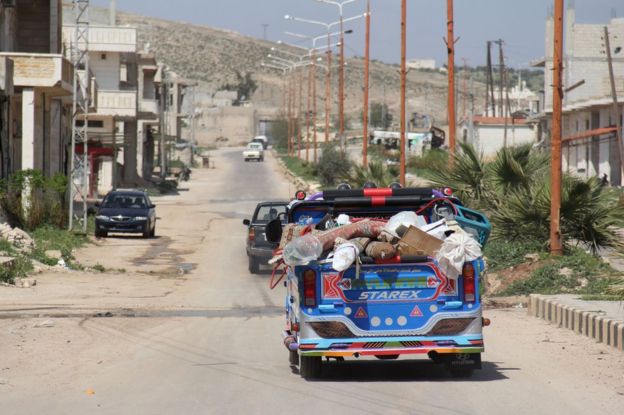Russia has promised to strengthen Syria’s anti-aircraft defences after the US bombarded a Syrian air base with missiles, reportedly destroying it.
US officials said the base had been used to launch a chemical weapons attack in north-western Syria that left dozens of civilians dead on Tuesday.
Russia, which backs President Bashar al-Assad, condemned the US strike.
It also suspended a deal with the US designed to avoid collisions between their air forces over Syria.
In the first direct US military action against Syria’s government, at least six people are reported to have been killed.
Some 80 civilians, including many children, died in the suspected nerve gas attack in the rebel-held town of Khan Sheikhoun in Idlib province. Syria denies using nerve gas.
America’s weapon of choice: Analysis by Jonathan Marcus, BBC defence & diplomatic correspondent
Cruise missiles fly low and have a relatively small radar cross-section so they are difficult to destroy with air defences. Russia may seek to improve Syria’s surface-to-air missile system in the wake of this US attack but it would be very much a case of shutting the stable door after the horse has bolted.
Syria used to have a highly effective national air defence system based on Soviet-era radars and missiles but it has been significantly weakened in the wake of the civil war and the loss of territory by the regime. Look at the ease with which the Israelis carry out strikes against Hezbollah arms convoys and weapons stores in Syria.
Russia has some of its most modern surface-to-air missile systems at its air base in Syria and radars with a huge reach but, for whatever reason, they too have not deterred Israeli strikes.
Their presence makes air strikes by manned US aircraft unlikely and for Washington the Tomahawk cruise missile will remain the weapon of choice
What do we know about the missile strike?
Two US Navy destroyers in the Mediterranean Sea fired 59 Tomahawk cruise missiles at Shayrat airfield in western Homs province at about 04:40 Syrian time (01:40 GMT).
They targeted aircraft, aircraft shelters, storage areas, ammunition supply bunkers and air defence systems at the Syrian government-controlled facility, according to the Pentagon.
It said the base was used to store chemical weapons and that “every precaution” had been taken to avoid casualties. The Russian military was informed beforehand, the Pentagon said.
Speaking from his Mar-a-Lago estate in Florida, US President Donald Trump said in a statement that he had acted to prevent the use of chemical weapons.
What are they saying on the ground?
Retired civil servant Mateea Zefa, who lives about 800m (874yds) from the base, went with his children to look at the base afterwards and found it “totally destroyed”.
“We saw lots of bombs,” he told the BBC by phone. “Loads of them. It was a tough night. My house was damaged, almost all the windows broke and some walls cracked.”
Houses on one side of the base were also “totally destroyed”, he added.
A nurse at Shayrat’s hospital, Ammar al-Khidr, recalled being woken by “big explosions” at “around 03:30 or 03:45”.
Some children and other people were injured by shards of breaking glass but no civilians were killed, she said.
The dead and seriously injured were all soldiers, she said, adding that they had been brought to her hospital.
Syrian state media say as many as nine civilians were killed in the strike, four of them children. The BBC is unable to confirm this information.
The Syrian army said there had been significant damage to the base.
What is different about this strike?
The US has led a coalition carrying out air strikes against jihadist groups in Syria since 2014 but this is the first time it has targeted government forces.
President Trump previously spoke out against US military involvement in Syria, instead calling for a greater focus on domestic interests.
US Secretary of State Rex Tillerson signalled a sudden shift in policy on Thursday, saying that Bashar al-Assad should have no role in a future Syria.
Dmitry Peskov, spokesman for Russian President Vladimir Putin, called the US strike an “act of aggression against a sovereign nation”.
Russia’s military said many cruise missiles had failed to hit their intended targets.
What do we know about the chemical ‘attack’?
Hundreds suffered symptoms consistent with reaction to a nerve agent.
BBC
 Q FM Africa's Modern Radio
Q FM Africa's Modern Radio
